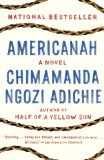Summary | Excerpt | Reading Guide | Reviews | Beyond the Book | Readalikes | Genres & Themes | Author Bio

Princeton, in the summer, smelled of nothing, and although Ifemelu liked the tranquil greenness of the many trees, the clean streets and stately homes, the delicately overpriced shops, and the quiet, abiding air of earned grace, it was this, the lack of a smell, that most appealed to her, perhaps because the other American cities she knew well had all smelled distinctly. Philadelphia had the musty scent of history. New Haven smelled of neglect. Baltimore smelled of brine, and Brooklyn of sun-warmed garbage. But Princeton had no smell. She liked taking deep breaths here. She liked watching the locals who drove with pointed courtesy and parked their latest model cars outside the organic grocery store on Nassau Street or outside the sushi restaurants or outside the ice cream shop that had fifty different flavors including red pepper or outside the post office where effusive staff bounded out to greet them at the entrance. She liked the campus, grave with knowledge, the Gothic buildings with their vine-laced walls, and the way everything transformed, in the half-light of night, into a ghostly scene. She liked, most of all, that in this place of affluent ease, she could pretend to be someone else, someone specially admitted into a hallowed American club, someone adorned with certainty.
But she did not like that she had to go to Trenton to braid her hair. It was unreasonable to expect a braiding salon in Princeton—the few black locals she had seen were so light-skinned and lank-haired she could not imagine them wearing braids—and yet as she waited at Princeton Junction station for the train, on an afternoon ablaze with heat, she wondered why there was no place where she could braid her hair. The chocolate bar in her handbag had melted. A few other people were waiting on the platform, all of them white and lean, in short, flimsy clothes. The man standing closest to her was eating an ice cream cone; she had always found it a little irresponsible, the eating of ice cream cones by grown-up American men, especially the eating of ice cream cones by grown-up American men in public. He turned to her and said, "About time," when the train finally creaked in, with the familiarity strangers adopt with each other after sharing in the disappointment of a public service. She smiled at him. The graying hair on the back of his head was swept forward, a comical arrangement to disguise his bald spot. He had to be an academic, but not in the humanities or he would be more self-conscious. A firm science like chemistry, maybe. Before, she would have said, "I know," that peculiar American expression that professed agreement rather than knowledge, and then she would have started a conversation with him, to see if he would say something she could use in her blog. People were flattered to be asked about themselves and if she said nothing after they spoke, it made them say more. They were conditioned to fill silences. If they asked what she did, she would say vaguely, "I write a lifestyle blog," because saying "I write an anonymous blog called Raceteenth or Various Observations About American Blacks (Those Formerly Known as Negroes) by a Non-American Black" would make them uncomfortable. She had said it, though, a few times. Once to a dreadlocked white man who sat next to her on the train, his hair like old twine ropes that ended in a blond fuzz, his tattered shirt worn with enough piety to convince her that he was a social warrior and might make a good guest blogger. "Race is totally overhyped these days, black people need to get over themselves, it's all about class now, the haves and the have-nots," he told her evenly, and she used it as the opening sentence of a post titled "Not All Dreadlocked White American Guys Are Down." Then there was the man from Ohio, who was squeezed next to her on a flight. A middle manager, she was sure, from his boxy suit and contrast collar. He wanted to know what she meant by "lifestyle blog," and she told him, expecting him to become reserved, or to end the conversation by saying something defensively bland like "The only race that matters is the human race." But he said, "Ever write about adoption? Nobody wants black babies in this country, and I don't mean biracial, I mean black. Even the black families don't want them."
Excerpted from Americanah by Chimamanda Ngozi Adichie. Copyright © 2013 by Chimamanda Ngozi Adichie. Excerpted by permission of Knopf, a division of Random House, Inc. All rights reserved. No part of this excerpt may be reproduced or reprinted without permission in writing from the publisher.
Your guide toexceptional books
BookBrowse seeks out and recommends the best in contemporary fiction and nonfiction—books that not only engage and entertain but also deepen our understanding of ourselves and the world around us.